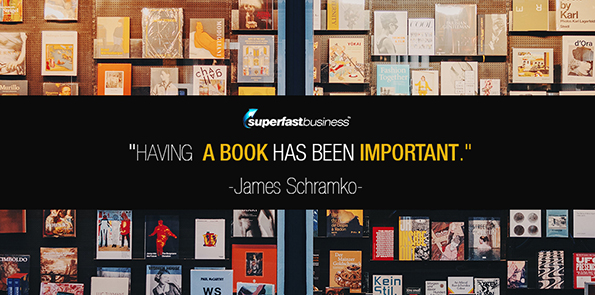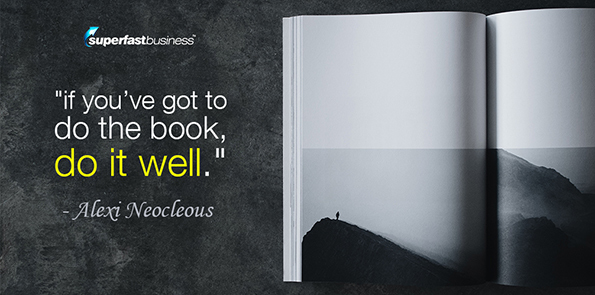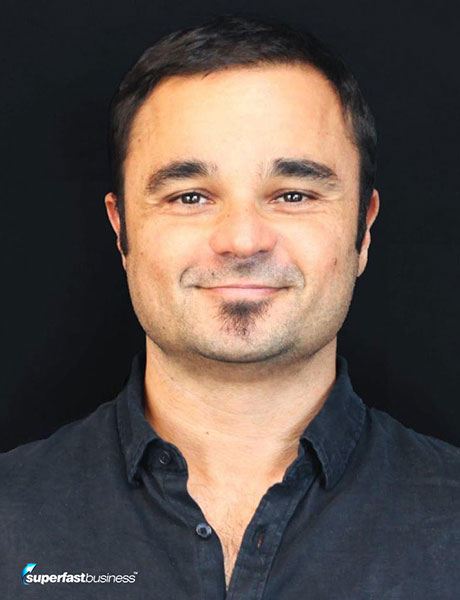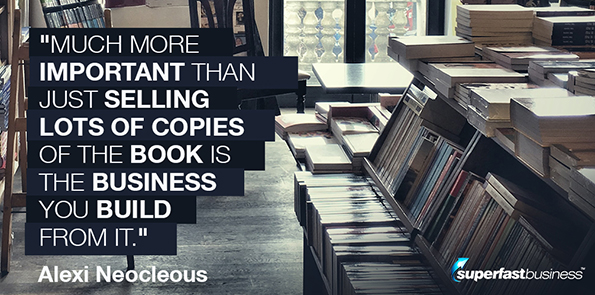A top level direct response copywriter with almost two decades of experience, Alexi Neocleous offers book writing and marketing services to business owners.
In this interview, he and James talk about the role books play now in business, why it’s not about the royalties, and why it’s worth putting in the effort to create a good book.
Podcast: Download (Duration: 26:01 — 24.0MB)
Get Notified Of Future Episodes Apple Podcasts | Spotify | Amazon Music | Android | Blubrry | Gaana | TuneIn | Deezer | Anghami | RSS | More
Podcast highlights:
01:38 – So, should you have a book?
02:49 – Full circle, and what a book can do for you
05:38 – It’s what you do when you’ve got the book that counts
08:02 – Where the money really is
10:46 – Forget about selling the book
12:20 – A great book versus “I don’t care if it’s read”
18:04 – The feedback on Fubbi
21:53 – Copywriting in book production
Build your personal and brand authority with help from James
Transcription:
James: James Schramko here. Welcome back to SuperFastBusiness.com. This is Episode 732. We’re going to talk about, why have a book, and how to use it to increase your sales. I’ve got Alexi Neocleous on the call. Hello, Alexi.
Alexi: Hello, mate. How are you?
James: Great. It’s always wonderful having a chat with you. You’re full of ideas, you circulate in some interesting environments, and you have your finger on the marketing pulse as a top-level copywriter. You’ve been behind the scenes in huge campaigns of nutraceuticals and so forth. You’ve been a specialist in the event industry, and recently been helping a lot of experts become authors with their own book. And I’d love you to share with us a little bit about this market, and what it means to us. If we’re listening to this podcast and we’re in business, are you an advocate that you should have a book?
So, should you have a book?
Alexi: Yeah. So I’m an advocate of having a book so that you get the authority-building benefits, virtually instant, of a book, which therefore sets up, at least in my opinion, one of the key reasons to have a book if you’re in business – to increase your sales. To get clients, increase your sales and so forth.
You know, book marketing is an interesting thing. So, over the years, most of my career, as you know, I was a direct response copywriter and wrote the sales copy for tons of books, in many ways helped authors directly one-on-one. And I’m a little bit slow on the uptake, you could say, that’s for damn sure. So we’ve had our content agency for the last three and a half years or something like that. And only in November of last year, which is also four months ago, did I really realize how big the book market is.
And so I realized, number one, we do all this content in terms of articles and videos and emails and stuff. Writing a book compared to what we do on the content marketing side is actually pretty easy for us. And so we did some testing on LinkedIn and so forth, and discovered very quickly the market is huge. And we get a lot of inquiries right now from people that are in business that need help with a book.
Full circle, and what a book can do for you
And then I think that I’ve sort of come full circle. Remember about 10 years ago, when ebooks really were all the rage and everybody was producing ebook after ebook? You remember when there were a big lot of ebooks?
James: Yeah, that’s like, back in the old days, it was like people were just cranking out pretty flimsy stuff, and putting them on Amazon was sort of the game.
Alexi: Yeah.
James: There was a whole industry around it.
Alexi: So what I noticed was, at the time was yet another ebook, you know, whatever. And just the whole, the perception of books, they took just a bit of a little blip, a little tinge for a bit, because there’s just a glut of ebooks. What I was noticing now is absolutely, it’s come back full and complete. Like, full circle, that if you’ve got a book, and especially if it’s well written, man, the status you get from that, the authority you get from that, the impact you get from people reading the book and if the content is good, what it can do for you is just mind blowing. Like with our book, Content Hacking, I mean, we use the book in different ways, but one of the ways that we use it is, if somebody reaches out and just inquires about our service, if they’re a potential good fit, they’ll get a copy of the book as a gift.
“The content does the job, but it’s also the status that’s attained from being an author.”
And I say to them, you don’t have to read the whole book. Just scan the table of contents. And if something grabs, you just dip in right there and just read it and see if it impacts you. And it doesn’t take many pages for them to read, again, if the book is written well, for a relationship to transform really quick, for someone to go from a cold-ish sort of relationship to much, much warmer very fast. And sure, the content’s done the job, but it’s also the status that’s attained from being an author. It’s quite impressive. I’m not saying anything new to you, obviously.
James: Well, I’ve got a book and we’ve talked about it a few times, the process of it, the reason for it. But I think one of the big themes here is, when some people think of having your own book, it reminds me of that saying, you know, “Everyone’s got a book in them,” and someone said, “For most people, that’s where it should stay.”
Alexi: Right.
 James: You know, they’re thinking that grand big novel, the thing that they’re going to become a Stephen King or something, like a really famous book publisher living off royalties. Living off royalties is really not the play for most of us in business. It’s the fact that you have a book that is important.
James: You know, they’re thinking that grand big novel, the thing that they’re going to become a Stephen King or something, like a really famous book publisher living off royalties. Living off royalties is really not the play for most of us in business. It’s the fact that you have a book that is important.
Once you’ve got a book, then you’ve now got a device that is great for positioning, for authority, for conversions. People who read the book are going to be really warm prospects for you and already sold on the methodology or the way you think. And you know, it actually fits into the category of a tripwire. We hear this term a lot – I think it came from the digital marketer world. But it’s that sort of low front end qualifier that helps you see when someone’s raised their hand from being interested to being quite interested. Dean Jackson would call it raising their hand. And you get the book out there, now people can show an interest, and they can follow through to the next thing.
It’s what you do when you’ve got it that counts
Now there’s various ways you can market the book, right? So we’ve seen book funnels are going to come up in the conversation for sure. Because I know, as someone who’s helping people engineer their books, it’s what you do with the book after you’ve got the book that’s important, right?
So just a quick recap. If there’s a big difference between having a book and not having a book in terms of the way people perceive you, it will determine what kind of interviews you’ll be invited to, how you can get your foot in the door for new introductions, etc, how you position yourself in the eyes of a prospect.
“In a digital world, anything physical stands out big time.”
And it certainly hasn’t hurt me, having a book sitting up there in the bestsellers in the business section or marketing section of Amazon, especially in the Australian market, which is no real surprise. Having it up there floating around with other book authors who I would say are my heroes has been incredible. And I also do send the book out to members of SuperFastBusiness when they join. I hand-autograph the book and put a personal note to them, and I mail it to them myself. And I know that gets a massive response. People are really touched by that. In a digital world, anything physical stands out big time, because the mailbox has a high open rate.
Alexi: Yeah, this is true. You’ve hit on a whole bunch of points I want to dig into here, the whole book marketing side of things.
So what most people think of as book marketing is Amazon bestseller, possibly New York Times bestseller, and if it’s a business book, Wall Street Journal bestseller. And Audible, too. Let’s let’s put Audible on the list. And there’s no doubt there’s value there for sure, in attaining those credentials. And they use that in your marketing and so forth. So that’s fine.
 But geez, talk about having, like, a partial view, or a narrow view on what’s possible. Because a book is epic as a conversion tool. It’s epic for positioning. So if you’ve got leads coming in from other sources, one amazing use of the book is someone’s inquired for your services or your coaching, whatever, send them a box, send them a pack, send them something in the mail, physically-printed book to aid in the “conversion process.”
But geez, talk about having, like, a partial view, or a narrow view on what’s possible. Because a book is epic as a conversion tool. It’s epic for positioning. So if you’ve got leads coming in from other sources, one amazing use of the book is someone’s inquired for your services or your coaching, whatever, send them a box, send them a pack, send them something in the mail, physically-printed book to aid in the “conversion process.”
And most book authors, if they only did that, and nothing else, would lead to a transformative result for them in terms of getting new clients through the door. And that’s certainly one way that we use my book. It’s to help compress the sales cycle and just make it easier for people to buy. And that alone, kills.
Where the money really is
James: Well, you know, just on that, I think a lot of that stagging the rankings racket has been shut down. People would just spend $100,000 and buy the books from all the different bookstores to try and snag a top ranking on those book lists. That’s just the pay-to-play game. That’s an ego, vanity thing. The positioning could really help sales and it might help distributors stock that book, but probably you’re not going to make so much money on the book itself. And almost always, those ones are done through a publisher where the actual author’s making a very slim margin at the end of the day. They’re not making anywhere near as much as a direct publisher.
The real money is in that back end part, or using it as a calling card. I’ve got to give credit to Allan Dib, actually, because every time he comes to visit me, he brings me a box of books. He throws these books. He gives them away to my event attendees, he gives me extra books, and even some bags to send them out with my book, because he knows I send mine, so he wants to piggyback them. He has got the number one marketing selling book on Amazon. And I know, because I work with him that it’s driving people into his certification programs and his coaching programs. Because if you go through the book and you want more, you can engage in an email sequence and then find other options.
Alexi: Yeah. In our world, Allan is doing among some of the best things with his book. And I remember at your gig, I think his words were, I’ll treat a book like candy. Can we give it out like candy?
James: Yes, that’s it. He even puts it on the bookstore shelves in places where he visits if it’s not already there, because it’s one of his guerrilla tactics. He’s a very good marketer. And I remember at that event, we gave out books of several of the people speaking. That was the one where you were the top speaker, which of course you have to pass on your title now to Ilana Wechsler, who this year is the top speaker at SuperFastBusiness Live.
Do you remember back in the day when there were live events, and you could go and hang out with people?
Alexi: It’s like ancient history, huh?
James: You know, it is an interesting thing. The real leverage for an online business is those offline events, and the real leverage for a digital marketer or coach, expert or author is a physical tangible thing. It’s an old world thing, the post, but it’s so powerful. I am at the post office every single week. I love it. It’s one of my favorite places to be. Because every time I’m sending out a book, it means that something good is happening.
Alexi: Well, that’s because of how you’re using the book, right? It’s used to trigger something supportive to your core business. It’s not just a book you’re sending out.
James: It’s like being Santa Claus. I’m giving out gifts all the time. I love it.
Alexi: Yeah. I mean, these are sensible ways to use books. Like again, it’s amazing. Like, for example, this week, let’s have a look now – I’ve had one, two, three, four, five, six – six conversations just today for people that want to get a book done. Okay?
James: Yeah.
Forget about selling the book
Alexi: And everybody, everybody has the same question around book marketing. I’m like, don’t even worry about the book marketing for the moment. If you have a business where the book can lead to subsequent services, products and so forth, forget about making money off the book. Don’t focus on, just for the moment, Amazon bestseller status and so forth. Your world of opportunity is so much bigger than that if you have a business and you’re willing to look at your book, not as something that you absolutely must make money on, and become the next, you know – I know Dan Brown’s a fiction author, but – the next Dan Brown or whatever, but treat it as part of your arsenal of other marketing activities that you’re doing. But a big piece of the puzzle, because of its positioning. They’re much more important than just selling lots of copies of the book is the business you build from it.
And I’m noticing, I’m having to explain it. Now, we have videos on this and trainings and so forth, but I still have to explain it because people don’t always watch the trainings. The mistaken understanding of the power of a book when you broaden your focus just a little bit, is especially true if you’re in services, consulting, coaching, advisory type businesses. And then from a personal branding viewpoint, I mean, you and I both know there’s probably no downside to having a big personal brand, because whatever you put your focus onto, like someone like Gary Vee, I mean, he’s endorsing what shoes, what he’s got. His whole spectrum of stuff.
James: It’s the age of having a bigger personal brand. And I made a shift to start building out my personal Facebook page, which I’d resisted for a long time, but I get way more engagement and results from that than the business page. It’s time to step out as a person if you can.
A great book versus “I don’t care if it’s read”
And I think some people might be scared of publishing a book because of the fear that, you know, they might get exposure and success. And I do remember when I first published mine, and it started to take off and I was getting reviews, I had this sort of slight flash of, oh my goodness, like, once this is out there, this is a whole new game. This is a different game we’re playing and it’s the bigger league. It’s like a level up.
“Some people might be scared of publishing a book because of the fear of exposure and success.”
Alexi: Look, it depends. I mean, your book’s obviously very, very good. And so yours is a serious book with serious content. And so it does go back to your use for it. And because we’ve got a client, and you and I know who I’m about to speak about, probably, his book, he couldn’t care less about the content. I’ll put it this way. It’s not on Amazon, not an Audible, not anything at all. Now I’m not saying to have a crappy book. In fact, I say the exact opposite, have a great book, but it does speak to, with a book, it’s also about what you do with it. And in this client’s case, now we did not do the book I’m about to talk about; we’re doing his next book, that’s actually going to be a strong book, because we’re doing it. Basically, his kind of book sells 30,000 copies a month, he’s driving lots of traffic to the book sales page. And then once people buy the book, they go through an upsell, down-sell sequence and then land on an auto webinar that educates them for an hour, and then the call to action at the end is a discovery call.
Now in this particular person’s case, he doesn’t care at all, not a bit, not one iota, if anybody reads the book. For him, it’s just a use case to get some of his paid ad traffic back, and then to get better qualified people through his funnel. I’m not saying have a mediocre book. I’m not even saying to have that exclusive sort of belief or focus on how you should market a book. But it does speak to, you know, have a great book, that’s great, but what you do with the book, on the marketing side, is pivotal. And whether you do a book funnel like I just suggested there, or you use it how I use it, in part, which is as a conversion mechanism as well, to our services, to help compress the sales cycle, you know? There’s a lot of incredibly beneficial ways that you can use a book to build your business, I guess is what I’m really trying to get across.
And if I did nothing else in this podcast today but open up eyes for people and they go, “Oh, okay. I always thought that a book, I have to make money off the 19 bucks or whatever I’m selling it for.” But that’s actually the small game. The bigger game is the subsequent sales, and I think I’ve done a good job on this podcast.
“Fifty percent of books on Kindles have never been opened once.”
James: Right. That sort of way of thinking is not uncommon, by the way. I know Dean Jackson is very much around turning people from invisible to visible by getting that opt-in for the book. Most people won’t read the book, let’s face it. Fifty percent of books on Kindles have never been opened once. Right? So the facts support that the main thing is to have a book, and that the title is appealing to your perfect prospect. I think that’s what Dean says.
You use the book to get the opt-in, which is when you can actually start to educate and motivate people. It’s one of his profit activators. Because now they can get your message and go into the next phase, which is the offers, and to actually buy something.
So your friend is obviously a very good marketer. For me, you know, from a personal perspective, I would want my book to be a minimum standard just because it’s part of my values system. I’m not a mercenary money man. It’s not all about dollars for me. I want my book to transform people. Some other people might say that’s ego; I’d say it’s probably just pride of workmanship. I want a book that, if it’s got my name on it, has to be a certain level. Maybe I spent a long time at Mercedes-Benz and I have a minimum standard that I want to be associated with. And, you know, I’m sure in your friend’s case, he doesn’t care about that.
Alexi: No, well, he doesn’t.
So let’s talk about Dean quickly, because you know, I’m a fan of Dean. And this is something where I will disagree with him on this one, and you and I’ve spoken about it separately. So he’s definitely right in the book title, no doubt. I know that my team put extra, extra, extra focus on the quality of the books that we do, than some of the output that I’ve seen from 90-minute books.
And here’s my thinking on that, though, apart from the reasons that you just said a moment ago, your name is on the book, there’s a standard there. Here’s my other thinking, if you’re selling big sort of ticket-type services, advice, and all that sort of stuff, if you’re a serious, serious dude, or dudette, for that matter (I don’t have any data to back this up, just some common sense here), there’s going to be some percentage of people that continue and deepen the relationship with you that absolutely read the book and were blown away. What number that is, whether it’s five percent, 10 percent, 20 percent, 30 percent, I don’t know.
But what I do know, if you have a great book, and someone has read your book, they’ve actually cracked open the cover and read it, and they’re blown away, you are, like, a superstar in their eyes. So if you come along and suggest a program like SilverCircle, or in that case content services, you’re going to get a hearing because you’ve got trust. So my concern is, if you go and slap together a book, in a context where you have a genuine business on the back end, big-ticket advisor or whatever it may be, and you’ve just sort of slapped together a book, you’ve done no real favor for yourself there in making it easier for yourself to handhold and support that person to the next stage in the relationship.
 So if you’ve got to do the book, do it well, is my thinking. Otherwise, don’t bother doing it at all.
So if you’ve got to do the book, do it well, is my thinking. Otherwise, don’t bother doing it at all.
James: Man, I’m on that page too. And I can tell you, the emails I get and the stories I get, the people who have read my book and had a transformation… I get private messages on Instagram, I get you know, success stories in SuperFastBusiness membership, but they say, you know, they’re a Work Less Make More success story. It makes it worth it. It’s like, it’s more than just a dollar sign for me. It’s pride of workmanship. It’s doing a good job. We all want to feel significant. We want to feel appreciated.
And I think having a good book is great. Probably I’d make more sales if I just gave it away as a front end hook and then back end really hard with some emails and stuff, but it’s just not the way I want to market. And we get to choose, which is the great thing.
Alexi: True.
The feedback on Fubbi
James: Of course, I’m going through your service right now with a book. So it’s really been fun in that process. I love the detail that comes through, there’s genuine craftsmanship in the way that the structure works, what the lessons you’ve learned from having put together a lot of books in terms of what bits need to go where, what you need from the expert to make the book work and what you’re prepared to go and get if they can’t give it to you. It’s all been a tremendous service over there at Fubbi.co, I believe you’re sitting on. We’ll put a link in the show notes as well, where you can check out Alexi’s book offer.
Alexi: Yeah. So it’s good that you’re saying that, though you and I both agreed part of the choice of me to do a book for you as well is you’ll critique the crap out of our systems.
James: There’s really not much to critique. So far, it’s been really impressive. And it’s a testimony to your dedication to feedback. That’s one thing I would rate you very highly with. You’re so open to learning and adjusting your process. And I think that’s reflective of what I’ve seen with guys you’ve worked with, too, like Ed O’Keefe, he’s exactly the same. He’s just so open to new process and feedback. And he just keeps innovating and evolving, and it’s a joy to see that.
Alexi: Well, yeah, I mean, that’s Ed’s personality, too. He’s not an argumentative person by nature. And so he’s quite open. But you’re right. I mean, that there’s no doubt about that. But I mean, if we go back to the Fubbi systems for a sec, it’s just an impossibility to do great work without hearing clients’ feedback, and then being open enough to say, you know what, this client’s correct. We can do better here. And upgrading the systems. Because you and I both know, when you had SEOPartner, eventually you get to a point where the circles within circles are so tight or so narrow and fine that from your viewpoint inside and out, you can always see improvements. But because we see the fine, the very, very fine, for us, like, I’m never satisfied, never happy pretty much, right? But yeah, systems.
But clients are like, holy moly. They don’t know the circle within the circle within the circle that’s remaining. And so one of our clients that we’re working with, well, I saw that they had a gig the other week, they were like, “Oh my god, Alexi, you should have sold us harder. You should have been more aggressive. If I’d known the experience would have been this good, oh my.” I’m like, “Yeah, but man, I mean, I can’t do that.” We’ve known each other for so many years. But he was like, “Whoever you want me to speak to, I’ll speak to them. I just can’t believe it. It’s incredible.” I’m like, ”Alright, thank you.” But to get to this point has been hearing your feedback, upgrading systems.
James: Well, I’ve been through the book process before. I’ve done the first book. What I do know is I don’t do the book myself very well. I tried for five years, didn’t work. Kelly Exeter came along and saved me. And she’s a great bespoke personal service. And I’m doing a book with her too, right now. This is an extra book I’m doing with you.
Alexi: Oh, wow.
James: Because I think I need at least a dozen books. I’ve got so much information that I want to share out there and get out of my head and find the leverage, and build courses and support people, and it’s a great income for me as well. So why not open up a few channels? Basically, you can either do it yourself, you can do a course to learn how to do it; you can hire someone who’s just going to work with you and they’re very bespoke, and then there’s this sort of system in between that’s very reasonably priced, that’s a machine that’s well tuned to produce books at a high level, that takes the load off you personally. And that’s where I think you sit. I like trying that experience. And it’s great to benchmark and test it against what else I’ve experienced before. And so far, smooth sailing.
Alexi: Yeah, I mean, that’s a good thing, thankfully. I expect nothing else, frankly. And I haven’t told the team. Like, they’re treating you like a normal client, which is the same as every client, which is super important. But if I told the team that you would definitely be feeding back to me an extra layer of feedback, I wouldn’t want them to prioritize you for the wrong reason, so to speak. Does that make sense?
James: Of course.
Copywriting in book production
Alexi: Yeah, okay, cool. So with these books, something else I want to get across as well that we’ve really put a lot of effort into, to being able to do is, my background as a copywriter has made their way into the systems. Because when we think through the book outline and we think through the outcome of the book and so forth, we really think through, sure, the content needs to be great. But how is the content impacting? How was it delivered so that it’s not boring? So that it’s engaging? And as my main copywriting mentor, Parris Lampropoulos – he’s Greek, as you can tell – the way he puts it is, surprise is an emotion. And if you can keep surprising people and offering up novelty, you’d literally get them addicted to your content, because they get little spurts of dopamine released as they go through your messaging.
“If you can keep surprising people and offering up novelty, you’ll literally get them addicted to your content.”
Now that applies to an article or a video, webinar, but also to a book. Because so much of my career was direct response copywriting, which is all about holding attention all the way through to a sale. I’ve been able to pass on to the team, via training and also our systems, how to think through the book, not as a piece of copy, but as a way to keep surprising people. And this is where, for example, we really go through the hard yards to get stories into the book.
Now, in your case, it’s going to be easier than most because you’ve got such a big body of work and such a long track record on, you know, pick your subject. But we’re helping you on the membership sites side of things. So the book we’re helping you on, as you know, is on membership sites. You got sh*t tons – excuse my language – boat tons of experience and track record there. So your book, because of the raw ingredients that you bring to the table, it’s just going to be a killer book. But often, we don’t get to have at our fingertips a client that is so primed for a great book. So then the team know, automatically, go and search for stories. Go and find surprising trends. Go and find eye-opening data. Get the essential elements together so that when we actually end up writing the book, we keep getting dopamine releases in the mind of the reader.
So they get to the end of the book, or read half the book or a third of the book, almost doesn’t matter where, they’re just like, Wow, what a great chapter, or, What a great section of a chapter, or something like that. So they’re, like, pulled in automatically to hopefully read the rest of the book. It’s doable. I’ll never say it’s easy, but this is where definitely my copywriting background is helping us.
James: Definitely your formulas, your structures, there are definitely variations on style and how much is going to be assisted. It’s kind of like an ebike, I would say the metaphor. So like, you can have the standard one, or you can have an ebike that will leverage whatever you put into the pedal, it’s just going to help you get a little bit further with less effort. That’s what someone like me needs.
Alexi: If I could invent a way for a client not to read their first draft, because that’s the biggest stumbling block, is I’ve received 140, a 150 pages, and now, like, right, you got to read your own book. Now unfortunately, if I could find a way to take that bump out of the road for a client, I would, but I don’t think that one’s possible.
James: Well, it sounds like you’ve got at least one client who doesn’t care.
Alexi: Well, yeah. Yeah, I mean, he will care about the second book we’re doing for him because it’s about his own life story, what he’s learned in business or so forth. His name’s on that one, that’s for sure.
James: Yeah. So there’s definitely some strong reading there. Good man.
Well, it’s always a pleasure hearing about your take on it. You’re a very skilled marketer, especially with that copywriting background. It’s great that your book thing is taking off. I’m not surprised, because people tend to be sitting around at home a little more these days, and we’re surrounded by our work and memories and files and stuff and people doing a cleanout and a sortout. So it’s good that the books are coming out. I think they’re gearing up for the next boom run, after things change a little bit. We’re going to be off to the races. And there’s a big difference between having a book and not having a book, in my experience, and then what you do with it is also important, and you’ve given some terrific ideas for us today, Alexi, I appreciate it very much.
Alexi: Thank you, mate.
James: There you go, that’s Alexi Neocleous from Fubbi.co. He’s got a great book service there. Check it out. Thank you for listening to SuperFastBusiness podcast.
Stay on top of the most effective marketing tools inside JamesSchramko membership
Liked the episode? Leave us a review on iTunes











Leave a Reply